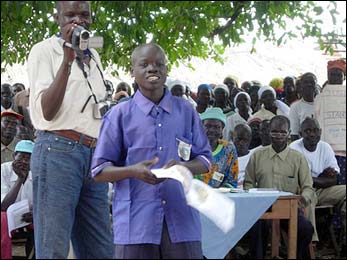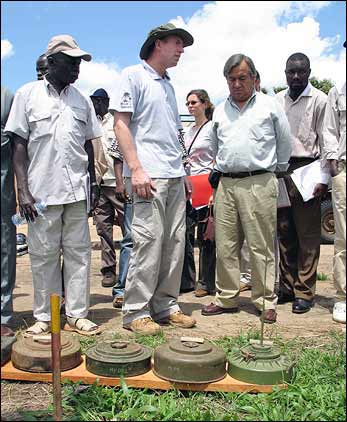UNHCR Chief appeals for more aid to meet South Sudan’s basic needs

Aug 29, 2005 (Yari) — Speaking underneath a huge shade tree in a South Sudanese village, UN High Commissioner for Refugees António Guterres promised on Sunday to “tell the chiefs of the rich people” in the world that they must do more to improve the lives of Africa’s people.
At a primary school being built by UNHCR – the only one to serve a community of 28,000 people – Guterres said the refugee agency is doing as much as it can with limited funds to improve life in South Sudan so people who fled their homes during 21 years of civil war can come home.
“We can help with some schools, some health centres, but we have not the money to help with everything you need,” he explained, adding that is why more money is needed from the international community for development aid.
He drew a clear link between development aid, economic growth and peace for a long-tortured region where even today landmines still deface the landscape and claim lives.
“If we want Ugandans to be in Uganda, Sudanese in Sudan and Portuguese in Portugal,” the former Portuguese prime minister said, “we must stop war. But it is very difficult to have peace if everybody is poor, if people don’t have enough to eat, if children don’t have schools.”
On the seventh day of a 10-day visit to the region, he drew loud applause from several hundred villagers and schoolchildren – nearly all of whom fled their home at some point over the last 21 years – when he said “I want everybody in the world to have a home.”

As refugees begin returning home on their own from neighbouring countries, and people displaced within Sudan are also on the move, UNHCR is working in Yei and other South Sudanese communities to drill boreholes and build schools and health clinics in order to improve conditions for people to return, rebuild their lives, and remain in their homeland for good.
At the colourful meeting complete with singing, drumming and dancing, Guterres heard how very basic the needs of this desperately poor community are. Yari, 27 km south of Yei in Equatoria province, has seen its population swell from 22,000 this year to 28,000 with the return of refugees and displaced people, but has almost no infrastructure or services and government officials work for no salary.
“Children should be healthy and have food and be immunized,” one primary school boy told him. A teenage girl representing children who cannot find any relatives said: “We should not be separated from our parents and families.”
Elizabeth, a former refugee who has recently returned from a long stay in Uganda, thanked UNHCR for building Yari’s brick school building, the only one in the region that is not just an open-air thatched hut.
“When we heard the school was being constructed, we gave praise to the Lord,” she told the High Commissioner. She said some families are so desperate for good education that they are leaving their children behind in schools in refugee camps in neighbouring countries and coming home to South Sudan alone.
And she and other illiterate women also wanted the benefit of an education. “We are begging you to let us have an adult literacy class to learn A, B, C, D,” she told Guterres, as other women cheered.
Earlier Sunday, in Yei, Guterres praised local leaders for their unflinching appraisal of the area’s needs, and their clear vision for the future. UNHCR is the only aid agency active in Yei, and has moved far afield of its usual mandate to undertake development-like activities. The refugee agency is trying to attract more traditional development agencies to create conditions for prosperity to ensure that returnees don’t have to flee again.
“We hope this will be a success story that can be an example for many other areas of Sudan, and many other African countries,” he said.
On a visit to Juba on Saturday, Guterres told South Sudan’s top leaders that UNHCR expects large numbers of refugees from the Central African Republic, Democratic Republic of the Congo and Ethiopia to be at the forefront of an organized return. There are an estimated 500,000 South Sudanese refugees outside the country and some 4.5 million displaced within Sudan, not counting the 200,000 refugees and 1.8 million displaced people who have fled the western Sudanese region of Darfur in the last two years.
Guterres will visit Kakuma refugee camp in northern Kenya, home to some 66,000 Sudanese refugees, on Tuesday before returning to Geneva later this week.
By Kitty McKinsey
In South Sudan

